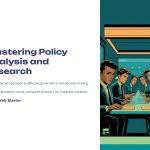
 Policy analysts play a critical role in shaping government decisions, corporate strategies, and public policies. Their ability to evaluate, interpret, and propose data-driven policies directly impacts society. Equally important is their proficiency in managing meetings effectively, ensuring discussions lead to actionable outcomes. Understanding both policy analysis and meeting management is essential for professionals aiming to influence decision-making processes.
Policy analysts play a critical role in shaping government decisions, corporate strategies, and public policies. Their ability to evaluate, interpret, and propose data-driven policies directly impacts society. Equally important is their proficiency in managing meetings effectively, ensuring discussions lead to actionable outcomes. Understanding both policy analysis and meeting management is essential for professionals aiming to influence decision-making processes.
The Role of a Policy Analyst
A policy analyst is responsible for researching, evaluating, and advising on policies that impact organizations and governments. They analyze complex data, forecast potential outcomes, and provide recommendations based on evidence. Their expertise spans various sectors, including economics, social policies, and regulatory frameworks. Effective policy analysts combine critical thinking with strong communication skills to translate data into actionable strategies.
Key responsibilities include:
- Conducting research and statistical analysis
- Assessing the economic, social, and political implications of policies
- Advising policymakers and stakeholders on evidence-based solutions
- Drafting reports, policy briefs, and recommendations
- Engaging with the public, government officials, and advocacy groups
Given the complexity of their work, policy analysts must continuously refine their ability to communicate findings clearly and persuasively. Effective meeting management further enhances their impact by ensuring discussions remain productive and goal-oriented.

Principles of Effective Meeting Management
Effective meetings are structured, goal-driven, and time-efficient. Poorly managed meetings waste time, dilute focus, and lead to decision paralysis. Policy analysts must master meeting facilitation techniques to ensure their insights contribute to meaningful discussions.
Best Practices for Meeting Success:
- Set Clear Objectives: Define the meeting’s purpose and desired outcomes in advance.
- Prepare an Agenda: Structure discussions around key issues and allocate time appropriately.
- Assign Roles: Designate a facilitator, timekeeper, and note-taker to keep the meeting on track.
- Encourage Participation: Foster open dialogue while keeping conversations focused.
- Use Data-Driven Insights: Support discussions with relevant statistics and case studies.
- Summarize Key Points: Recap decisions and assign action items before concluding the meeting.
By following these principles, policy analysts can lead effective meetings that translate complex policy discussions into actionable strategies.

Leveraging Data in Policy Discussions
Policy discussions must be grounded in factual data to avoid subjective debates. Data-driven decision-making enhances credibility and ensures that policies address real-world issues.
Strategies for Integrating Data:
- Use Visual Aids: Graphs and charts help simplify complex datasets.
- Reference Case Studies: Past policy successes and failures provide valuable insights.
- Analyze Trends: Identifying patterns helps predict future policy outcomes.
- Benchmark Against Global Standards: Comparing policies internationally ensures best practices are considered.
When meetings prioritize evidence-based discussions, stakeholders are more likely to reach informed and impactful decisions.
Overcoming Common Meeting Challenges
Despite best efforts, meetings often face obstacles that hinder productivity. Identifying and addressing these challenges ensures smoother discussions.
Common Challenges & Solutions:
- Lack of Focus: Stick to the agenda and redirect off-topic conversations.
- Dominant Voices: Encourage balanced participation by soliciting input from quieter members.
- Decision Fatigue: Limit meeting duration to prevent mental exhaustion.
- Unclear Next Steps: Clearly assign tasks and responsibilities before closing.
A well-managed meeting fosters collaboration and streamlines decision-making, making it an invaluable skill for policy analysts.
5imz_ The Impact of Digital Tools on Meeting Efficiency
Technology plays a pivotal role in modern meeting management. Digital tools facilitate remote collaboration, enhance documentation, and improve time management.
Essential Tools for Policy Analysts:
- Video Conferencing Software: Zoom, Microsoft Teams
- Collaboration Platforms: Google Workspace, Notion
- Project Management Tools: Trello, Asana
- Survey & Data Tools: Google Forms, Tableau
Leveraging these tools ensures meetings are well-documented and accessible to all stakeholders.
6imz_ Conclusion: Elevating Policy Impact Through Effective Meetings
The effectiveness of a policy analyst is not just measured by their research but also by their ability to communicate insights persuasively. Mastering meeting management enhances their influence, ensuring policy discussions lead to actionable change. By combining data-driven analysis with structured meeting practices, policy analysts can drive meaningful policy advancements and contribute to better decision-making.
*Capturing unautho rized images is prohibited*
rized images is prohibited*






